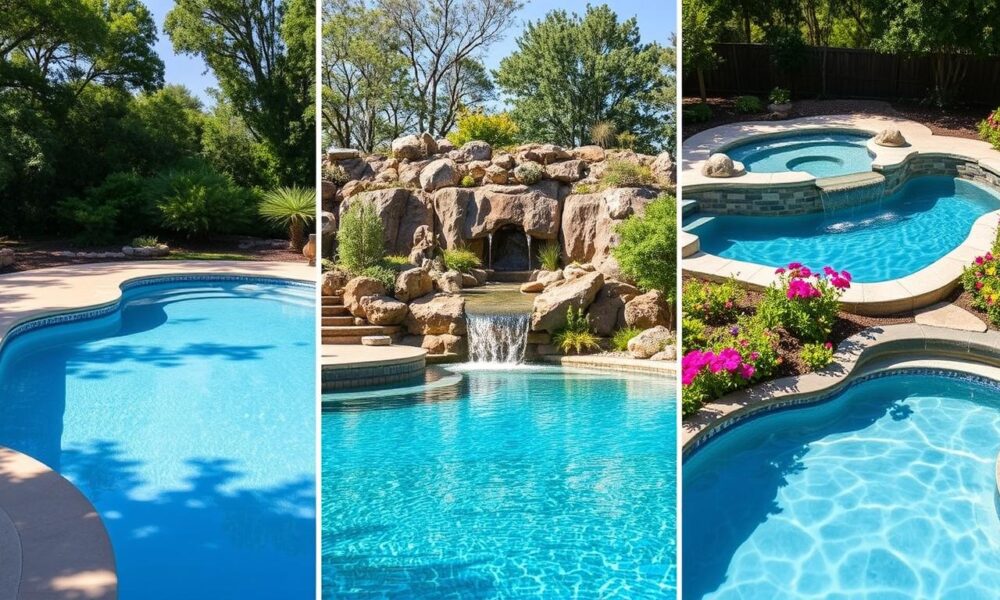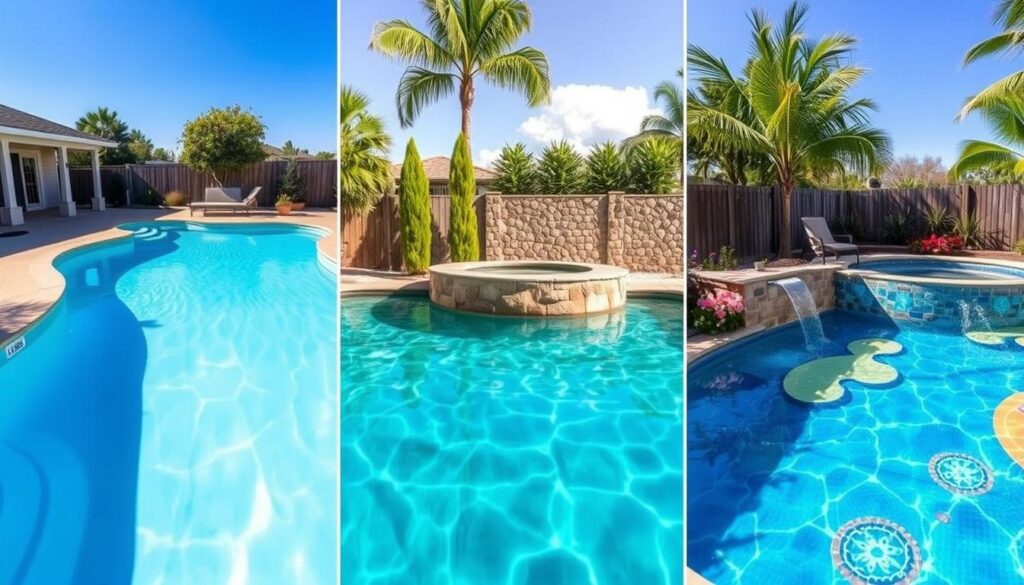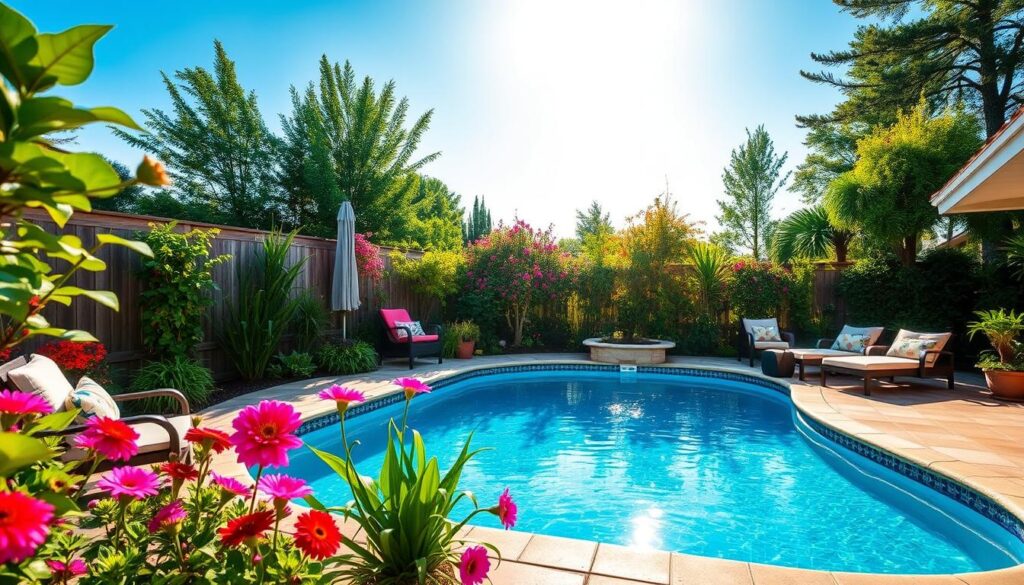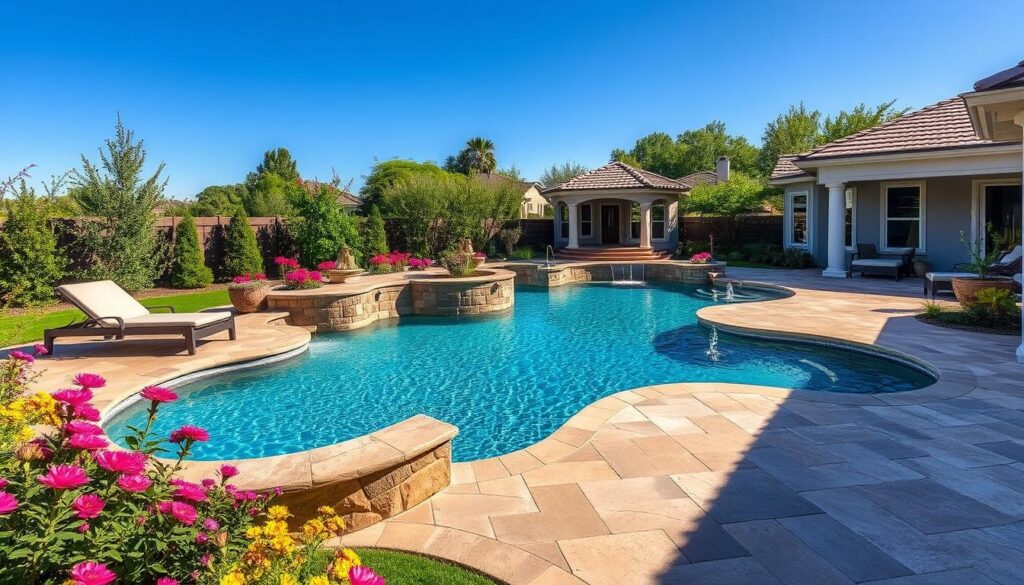
Comparing Types of Pools: Fiberglass vs. Gunite vs. Vinyl
Transforming your backyard into a personal paradise starts with choosing the right types of pools. In this guide, we’ll explore the three most popular options—fiberglass, gunite, and vinyl pools. We’ll dive into their unique features, pros, and cons, helping you understand which pool type best suits your lifestyle, budget, and design preferences. By the end, you’ll have a clear idea of which pool will turn your dream backyard into a reality.
Key Takeaways
- Fiberglass pools are known for their low-maintenance and customizable design options.
- Gunite pools offer unparalleled durability and the ability to create unique shapes and features.
- Vinyl liner pools provide an affordable and versatile solution with a wide range of customization possibilities.
- Factors such as climate, installation costs, and long-term maintenance requirements should be carefully considered when choosing a pool type.
- Working with experienced pool contractors is essential to ensure a successful pool installation and ongoing enjoyment of your outdoor oasis.
Introduction to Pool Types
Choosing the right pool materials can make a big difference in your backyard oasis. Each type, from fiberglass to vinyl liner, has its own benefits and things to think about. We’ll explore these pool materials and what to consider when picking the best one for you.
Overview of Different Pool Materials
Fiberglass pools are smooth, flexible, and easy to care for. Gunite pools are customizable and last a long time. Vinyl liner pools are affordable and come in many colors and patterns.
Factors to Consider When Choosing a Pool Type
When picking types of pool for your home, think about a few things:
- Installation costs and timelines
- Long-term maintenance and lifespan
- Resale value and aesthetic appeal
- Local climate and environmental considerations
- Energy efficiency and sustainable options
Considering these factors will help you choose a pool that fits your budget and lifestyle. It’s important for your pool materials and pool type to match your long-term goals.

Fiberglass Pools: The Low-Maintenance Option
Fiberglass pools are gaining popularity among homeowners looking for easy upkeep. They are known for their smooth surface, resistance to algae, and simple cleaning. This makes them a favorite among many pool lovers.
Advantages of Fiberglass Pools
- Smooth Finish: Fiberglass pools have a sleek, seamless surface. This offers a comfortable and pleasing experience for swimmers.
- Algae Resistance: Fiberglass’s non-porous nature makes it hard for algae to grow. This means less cleaning and upkeep for you.
- Easy Cleaning: Cleaning fiberglass pools is straightforward. It takes less time and effort than other pool types.
- Quick Installation: Fiberglass pools are installed faster than concrete or vinyl pools. This shortens the project timeline.
Disadvantages of Fiberglass Pools
Despite their many benefits, fiberglass pools have some downsides to consider:
- Limited Customization: Fiberglass pools come in set sizes and shapes. This limits customization options compared to other pool types.
- Susceptibility to Cracks: Fiberglass pools can crack or deform over time. This is more common in areas with earthquakes or unstable soil.
- Higher Replacement Cost: If a fiberglass pool needs major repairs or replacement, it can be expensive. Costs may be higher than for other materials.
In summary, fiberglass pools are a low-maintenance, efficient choice for homeowners. However, it’s important to consider both the pros and cons to see if they fit your needs and preferences.

Gunite Pools: Customizable and Durable
Gunite pools are perfect for creating a backyard oasis. They offer great customization and last a long time. Homeowners can make gunite pools that fit their needs and style.
Gunite pools can be shaped in many ways. You can have a classic shape or something more unique. This makes them great for matching your home and yard.
Gunite pools are also very durable. They’re made from cement, sand, and water, sprayed on a metal frame. This makes them strong and long-lasting.

For those who want a long-lasting pool, gunite pools are a top choice. They offer great customization and durability. These pools are a smart investment for your outdoor space.
Vinyl Liner Pools: Affordable and Versatile
Vinyl liner pools are a hit with homeowners looking for a budget-friendly and flexible option. They can be made to look any way you want and are easy to set up. This makes them a great choice for many.
Benefits of Vinyl Liner Pools
Vinyl liner pools are cheaper than other types like gunite or fiberglass. This makes them a good pick for those on a budget. Plus, the liners can be swapped out when they get old or damaged, which is pretty affordable.
These pools also offer a lot of design options. You can choose from many colors and patterns to match your style or backyard. This flexibility is perfect for creating a unique outdoor space.
Drawbacks of Vinyl Liner Pools
Despite their benefits, vinyl liner pools have some downsides. The liners don’t last as long as some other materials, needing to be replaced every 5 to 10 years. This can add up in maintenance and replacement costs over time.
Also, vinyl liners can get damaged easily by sharp objects or heavy use. This might be a problem for families with kids or those living in areas with harsh weather. It could lead to leaks or more frequent repairs.
Exploring the Variety of Pool Types
Swimming pools come in many types, not just fiberglass, gunite, and vinyl liner. There’s a wide range of pools, each with its own special features. You can find everything from above-ground pools to infinity pools, making it easy to find the right one for your backyard.
Above-ground pools are a great choice for those looking to save money and have an easy setup. Infinity pools, on the other hand, give the illusion of water flowing into the distance. They add a touch of class to any yard.
Semi-inground pools offer a mix of in-ground and above-ground pools. They’re partially buried, allowing for customization to fit your yard and style.
The pool world keeps growing with new designs and features. You can find lap pools for serious swimmers or shallow pools for families with little ones. There’s a pool for every backyard and lifestyle.
When looking at different pools, think about costs, upkeep, and what each pool offers. This helps you choose the best pool for your dream backyard.
Comparing Installation Costs and Timelines
Pool installation costs and timelines vary by pool type. Whether you choose fiberglass, gunite, or vinyl liner, knowing the costs and time needed is key. This helps you make a smart choice.
Installation Costs for Different Pool Types
Pool installation costs range from a few thousand to tens of thousands of dollars. Fiberglass pools are the cheapest, costing $15,000 to $30,000. Gunite pools are the priciest, with costs between $30,000 and $60,000. Vinyl liner pools cost between $20,000 and $45,000.
Time Required for Installation
Installation times also differ by pool type. Fiberglass pools are the fastest, taking 2-4 weeks. Gunite pools take longer, often 4-8 weeks. Vinyl liner pools take 3-6 weeks.
When planning your pool, consider the pool installation costs and installation timeline. This helps you budget and plan better.
Long-Term Maintenance and Lifespan
Choosing the right pool type is key to keeping it in top shape for years. Each material, like fiberglass, gunite, or vinyl liner, has its own upkeep needs and lifespan. Homeowners need to think about these factors carefully.
Maintenance Requirements for Each Pool Type
Fiberglass pools are easy to care for. They need less cleaning and chemical treatments than others. With the right care, they can last up to 20 years or more.
Gunite pools, however, need more attention. They require regular cleaning of tiles, refinishing of plaster, and fixing cracks. With good care, they can last 25 to 50 years.
Vinyl liner pools have their own upkeep challenges. The liner, lasting 8 to 12 years, needs to be replaced often. These pools also need regular chemical balancing and cleaning. With proper care, they can offer many years of fun.
Homeowners should think about pool maintenance and pool lifespan when picking a pool. Knowing the maintenance requirements for different pool types helps keep your pool in great shape for a long time.
Resale Value and Aesthetic Appeal
Choosing the right pool material can greatly affect your backyard’s look and your home’s resale value. A beautiful pool can attract buyers, while a bad one can lower your home’s value. It’s all about making your pool a highlight of your home.
Fiberglass pools are sleek and modern, making them attractive to buyers. Gunite pools are customizable, allowing you to create a unique space. Vinyl liner pools are cheaper but might not impress as much as fiberglass or gunite pools.
The condition and upkeep of your pool also matter a lot. A clean, updated pool will catch the eye of buyers. But a neglected pool might seem like a big problem to fix.
- Fiberglass pools are sleek and modern, making them attractive to buyers.
- Gunite pools offer a more customizable and versatile design, allowing you to create a unique backyard oasis that complements the pool appearance of your home.
- Vinyl liner pools may be more affordable, but they may not have the same level of visual impact or pool resale value as fiberglass or gunite pools.
The pool you choose can really change how your home looks and feels. By picking wisely and working with a pro, you can make a beautiful backyard oasis. This oasis will not only be perfect for you but also boost your home’s value.
Local Climate and Environmental Considerations
Choosing the right pool type depends on your local climate and environment. The climate in your area affects the pool material’s performance and lifespan. Factors like temperature, humidity, and natural elements impact fiberglass, gunite, and vinyl liner pools.
Climate’s Effect on Pool Material Choice
In areas with extreme temperatures, picking the right pool material is key. Fiberglass pools work well in milder climates but can crack or warp in extreme heat or cold. On the other hand, gunite pools handle a variety of climates, making them popular in places with big seasonal changes.
Vinyl liner pools need more care in sunny or stormy areas because the liner can get damaged easily. Knowing your local climate and environmental considerations helps choose the best climate and pool material for you.
- Fiberglass pools may perform better in milder climates
- Gunite pools can withstand a wider range of climates
- Vinyl liner pools may require more maintenance in high UV or storm-prone areas
Researching your environmental considerations and local climate is crucial. It ensures your pool is a lasting and enjoyable part of your outdoor space.
Energy Efficiency and Sustainable Options
Homeowners are now looking for ways to make their pools more eco-friendly. This includes finding energy-efficient pool equipment and features. These options help cut down on carbon emissions and save money in the long run.
Using a variable-speed pool pump is a smart choice. These pumps use much less electricity than old models. They save a lot of energy over time. Another good option is a solar pool heater. It uses the sun’s heat to warm your pool, cutting down on fossil fuel use.
For a greener pool, think about adding energy efficient pools and sustainable pool options. You could use solar lights, efficient filters, and pool covers. These features help save energy and reduce water loss. They let you enjoy your pool while being kind to the planet.
Choosing the right equipment and features is key to a green pool. By focusing on energy efficient pools and sustainable pool options, you can have a beautiful pool that’s also good for the environment.
Working with Professional Pool Contractors
Finding the right pool contractor is key to a smooth pool installation. A professional can turn your backyard into a paradise. We’ll look at what to consider when picking the best contractor for your pool.
The Importance of Choosing the Right Contractor
A good pool contractor makes a big difference. They handle everything from permits to construction. This ensures your pool is built right and looks great.
When searching for pool contractors, do your homework. Look for those with a good reputation, proper licenses, and positive feedback. This helps you choose the right pool contractor for your needs and get a professional pool installation.
- Verify the contractor’s license and insurance coverage
- Check their portfolio of previous pool projects
- Read online reviews and testimonials from past clients
- Ask for referrals and contact them to understand the contractor’s work ethic
- Ensure the contractor is familiar with local building codes and regulations
By following these steps, you can trust your pool contractor choice. Enjoy a hassle-free pool installation that turns your backyard into a stunning oasis.
Conclusion
In this guide, we’ve looked at the main features of fiberglass, gunite, and vinyl liner pools. We’ve talked about their good points and downsides. This helps you pick the best pool for your home, budget, and lifestyle.
Whether you want something easy to maintain, a pool you can customize, or a budget-friendly option, there’s a pool for you. It can turn your backyard into a personal paradise.
If you’re ready to make your pool dreams come true, call Friendswood Custom Pools at (346) 485-3356 for a free chat. Their team of experts can guide you through the pool types comparison. They’ll help you choose the right pool for you.
Choosing the perfect pool is more than just looks. It’s about finding a balance between function, durability, and upkeep. By thinking about all these points, you can pick the best pool. And create the outdoor space you’ve always wanted.
FAQ
What are the main types of pools?
The main types of pools are fiberglass, gunite, and vinyl liner.
What are the advantages of a fiberglass pool?
Fiberglass pools are easy to maintain and have a smooth finish. They resist algae and are quick to install.
What are the benefits of a gunite pool?
Gunite pools are customizable and durable. They can be any shape or size and last a long time.
What makes vinyl liner pools a good choice?
Vinyl liner pools are affordable and versatile. They come in many designs and are easy to set up.
How do the installation costs and timelines differ between pool types?
Costs and times vary by pool type. Fiberglass pools are the cheapest and fastest. Gunite pools are more expensive and take longer.
What are the long-term maintenance requirements for each pool type?
Fiberglass pools need the least maintenance. Gunite pools require more cleaning. Vinyl liner pools need liner replacements every 5-10 years.
How do the different pool types impact resale value and aesthetic appeal?
Pool type affects your backyard’s look and home value. Gunite pools are often the most appealing and increase value. Fiberglass and vinyl liner pools have less impact.
How does climate affect the choice of pool material?
Climate is key in choosing a pool type. Temperature, humidity, and natural elements affect fiberglass, gunite, and vinyl liner pools.
What sustainable and energy-efficient pool options are available?
There are many energy-saving and eco-friendly pool options. Solar-powered equipment and green chemicals can reduce costs and carbon footprint.
How can I find the right pool contractor?
Choosing the right contractor is important for a smooth pool installation. Look at their experience, licensing, and reviews to get the best service.

